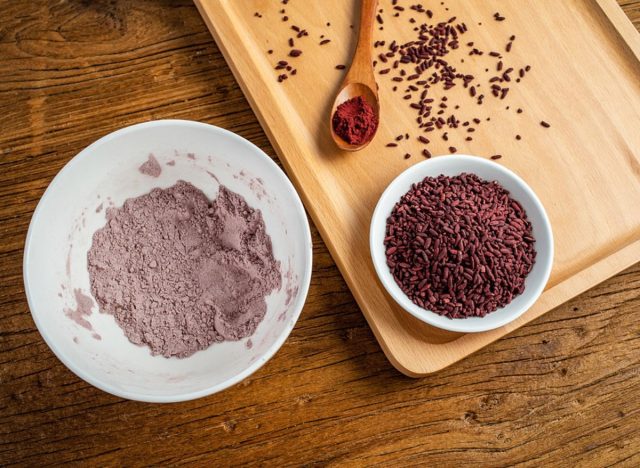Calcium & Iron, Plus Other Supplement Pairs You Should Never Take Together

If you like to ensure that you're getting all of the vitamins and nutrients that your body needs in order to function as well as possible, then there is a good chance that you take supplements. In fact, the National Health and Nutrition Examination Survey found that over 50% of men and more than 63% of women in the United States who were 20 years old or older had taken a supplement within 30 days of the survey, according to the CDC. On top of that, people were more likely to take supplements as they got older while also generally relying on two or more different supplements as they aged.
Although the aim of taking these supplements is to keep you healthy, Harvard Medical School points out that there are also potential dangers. For instance, getting too much vitamin E can result in a stroke, while excessive and long-term consumption of vitamin B6 has been connected to nerve damage.
With that in mind, Susan Bowerman, M.S., R.D., CSSD, CSOWM, FAND, senior director of Worldwide Nutrition Education and Training at Herbalife Nutrition, tells Eat This, Not That! that you'll want to avoid taking the following supplement combinations together in order for them to truly help you improve your health.
Copper and zinc

Although you might not think of copper as a common supplement choice, you actually need the mineral in your system for quite a few reasons, including the fact that it helps the body make red blood cells, produce collagen, and absorb iron, according to Medical News Today. As for zinc, it can benefit your immune system and skin, while potentially helping to prevent osteoporosis. However, neither copper nor zinc will do much good if you take them together.
"These two minerals compete with one another for absorption in your gut, and zinc has a tendency to win out," says Bowerman. "This means that taking too much zinc relative to the amount of copper you take could result in a copper deficiency over time."
Bowerman adds that, "This is why it is generally safer to take a multivitamin or mineral supplement, since they are designed to provide nutrients in the proper balance." That way, you don't have to worry about knowing which supplement pairs to avoid.
Calcium and iron
"Another supplement pair that is well-known is iron and calcium," says Bowerman. "Calcium, in any form, can inhibit iron absorption because they compete for attachment to the same receptors in the digestive tract, which facilitate uptake."
She adds that, "Premenopausal women are most at risk for both mineral deficiencies and should pay especially close attention to how and when they obtain these two nutrients." Bowerman says, "Ideally," calcium and iron "should be taken at different times of the day to maximize absorption."
Fiber supplements and zinc, magnesium, iron, calcium, or phosphorus

As Bowerman points out, "Fiber is an important nutrient, but many people don't consume enough and may turn to fiber supplements to meet their needs." However, Bowerman also says that "If you take in a large amount of fiber in a short period of time, it could interfere with the absorption of minerals such as zinc, magnesium, iron, calcium, and phosphorus."
For those who feel the need to take fiber supplements, Bowerman suggests that you "Make sure that your intake of fiber from a combination of foods and supplements stays close to the recommended 25 grams per day for women and 38 grams per day for men to lessen the risk of decreased mineral absorption."
Iron and green tea extract
Bowerman notes that "Iron has many important roles in the body, including facilitating oxygen transport." Despite that, "Many people—especially premenopausal females—do not obtain adequate iron in the diet."
At the same time, Bowerman explains that many people also "consume green tea in capsule form as a supplement." However, green tea "contains polyphenol compounds that can inhibit iron uptake." That's why Bowerman says that "If you choose to supplement with both iron and green tea, try to space their intake out by at least a couple of hours."
Red yeast rice and high doses of niacin

If you take a red yeast rice supplement, then you may or may not be aware of the fact that, as Bowerman explains, it "naturally contains statin compounds and is used to help reduce cholesterol levels." Similarly, "High doses of niacin are also sometimes used as a means to lower blood cholesterol." Unfortunately, Bowerman says that you shouldn't take them at the same time because "the combination of the two may interfere with normal muscle function."
It's always best to talk with your doctor or dietitian before starting a new supplement, but avoiding the combinations listed above is a good place to start when it comes to confidently taking the proper vitamins and minerals for your health.









